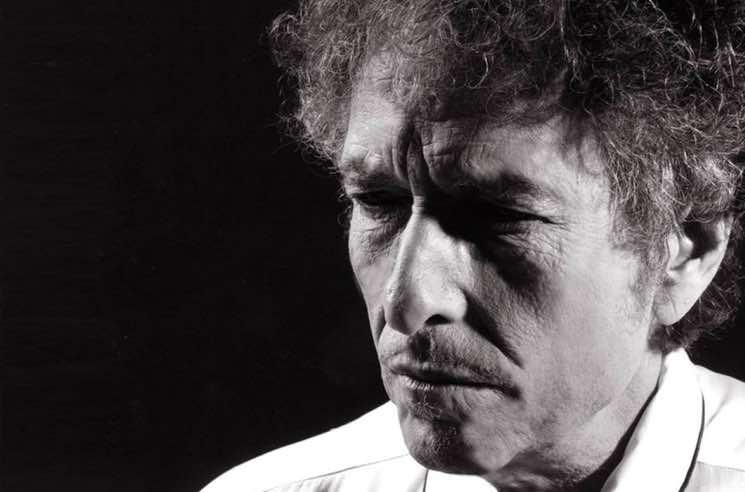Bob Dylan is ready to release his massive triple album of classic American songs, Triplicate, at the end of the month, and he'll embark on a hefty Canadian tour later this summer — but first, he's given fans some insight into his current headspace thanks to a wide-ranging interview with Bill Flanagan.
The conversation was posted to Dylan's official website last night (March 22), and there's plenty for fans to dig into.
He talks about everything from his creative process on Triplicate and the relevancy of the classic tunes in the modern world, to maturing as an artist and the bizarre nature of fame.
Over the course of the interview, Dylan admits that he doesn't hang out with the artists that tour with him ("Why would they want to hang out with me anyway?"), but reveals that he himself got nervous any time esteemed guests like presidents, kings, a pope, movie stars, the Beatles and Muhammad Ali attended his shows.
He also talks about films that have inspired his own songwriting (The Robe, King of Kings, Samson and Delilah, Picnic and A Face in the Crowd), and how a falling out with his manager led to him missing out on the titular male lead in Bonnie and Clyde.
Then there are his connections to all kinds of fellow musicians — like he and George Harrison's failure to show up to their scheduled recording session with Elvis, his connection to Ornette Coleman, and tackling a cover song recently perfected by Willie Nelson.
Find a selection of quotes from the interview below, and head over here to dive head-on into the whole thing.
Triplicate is due out March 31 via Columbia.
On meeting Frank Sinatra:
I think he knew "The Times They Are a-Changin'" and "Blowin' In the Wind." I know he liked "Forever Young," he told me that. He was funny, we were standing out on his patio at night and he said to me, "You and me, pal, we got blue eyes, we're from up there," and he pointed to the stars. "These other bums are from down here." I remember thinking that he might be right.
On Ornette Coleman:
I knew Ornette a little bit and we did have a few things in common. He faced a lot of adversity, the critics were against him, other jazz players that were jealous. He was doing something so new, so groundbreaking, they didn't understand it. It wasn't unlike the abuse that was thrown at me for doing some of the same kind of things, although with different forms of music.
On "saving the best for last" with the structure of his new three-disc album:
It seems that way because it's a human story that builds to a climax and it's personal from end to end. You start out wondering why you bought those blue pajamas and later you're wondering why you were born. You go from the foolishly absurd to the deadly serious and you've passed through the gaudy and the nasty along the way. You get to the edge and you're played out and you wonder where's the good news? Isn't there supposed to be good news? It's a journey like the song "Skylark," where your heart goes a-journeying over the shadows and the rain. And that's pretty much it. It's a journey of the heart. The best had to be saved for last.
On what he's been listening to lately:
Iggy Pop's Après, that's a good record. Imelda May, I like her. Valerie June, The Stereophonics. I like Willie Nelson and Norah Jones' album with Wynton Marsalis, the Ray Charles tribute record. I liked Amy Winehouse's last record.
On how the deaths of Muhammad Ali, Merle Haggard, Leonard Cohen, Leon Russell hit him:
Sure, they all did — we were like brothers, we lived on the same street and they all left empty spaces where they used to stand. It's lonesome without them.
On his upbringing in Minnesota:
Minnesota has its own Mason Dixon line. I come from the north and that's different from southern Minnesota; if you're there you could be in Iowa or Georgia. Up north the weather is more extreme – frostbite in the winter, mosquito-ridden in the summer, no air conditioning when I grew up, steam heat in the winter and you had to wear a lot of clothes when you went outdoors. Your blood gets thick. It's the land of 10,000 lakes — lot of hunting and fishing. Indian country, Ojibwe, Chippewa, Lakota, birch trees, open pit mines, bears and wolves — the air is raw. Southern Minnesota is farming country, wheat fields and hay stacks, lots of corn fields, horses and milk cows. In the north it's more hardscrabble. It's a rugged environment – people lead simple lives, but they lead simple lives in other parts of the country too. People are pretty much the same wherever you go. There is good and bad in most people, doesn't matter what state you live in. Some people are more self-sufficient than other places – some more secure, some less secure – some people mind their own business, some don't.
On being the jester in Don McLean's "American Pie":
Yeah, Don McLean, "American Pie," what a song that is. A jester? Sure, the jester writes songs like "Masters of War," "A Hard Rain's a-Gonna Fall," "It's Alright, Ma" – some jester. I have to think he's talking about somebody else. Ask him.
On what he watched on his tour bus:
I Love Lucy, all the time, non-stop.
Pick up a copy of The Songs of Leonard Cohen via Umusic.
The conversation was posted to Dylan's official website last night (March 22), and there's plenty for fans to dig into.
He talks about everything from his creative process on Triplicate and the relevancy of the classic tunes in the modern world, to maturing as an artist and the bizarre nature of fame.
Over the course of the interview, Dylan admits that he doesn't hang out with the artists that tour with him ("Why would they want to hang out with me anyway?"), but reveals that he himself got nervous any time esteemed guests like presidents, kings, a pope, movie stars, the Beatles and Muhammad Ali attended his shows.
He also talks about films that have inspired his own songwriting (The Robe, King of Kings, Samson and Delilah, Picnic and A Face in the Crowd), and how a falling out with his manager led to him missing out on the titular male lead in Bonnie and Clyde.
Then there are his connections to all kinds of fellow musicians — like he and George Harrison's failure to show up to their scheduled recording session with Elvis, his connection to Ornette Coleman, and tackling a cover song recently perfected by Willie Nelson.
Find a selection of quotes from the interview below, and head over here to dive head-on into the whole thing.
Triplicate is due out March 31 via Columbia.
On meeting Frank Sinatra:
I think he knew "The Times They Are a-Changin'" and "Blowin' In the Wind." I know he liked "Forever Young," he told me that. He was funny, we were standing out on his patio at night and he said to me, "You and me, pal, we got blue eyes, we're from up there," and he pointed to the stars. "These other bums are from down here." I remember thinking that he might be right.
On Ornette Coleman:
I knew Ornette a little bit and we did have a few things in common. He faced a lot of adversity, the critics were against him, other jazz players that were jealous. He was doing something so new, so groundbreaking, they didn't understand it. It wasn't unlike the abuse that was thrown at me for doing some of the same kind of things, although with different forms of music.
On "saving the best for last" with the structure of his new three-disc album:
It seems that way because it's a human story that builds to a climax and it's personal from end to end. You start out wondering why you bought those blue pajamas and later you're wondering why you were born. You go from the foolishly absurd to the deadly serious and you've passed through the gaudy and the nasty along the way. You get to the edge and you're played out and you wonder where's the good news? Isn't there supposed to be good news? It's a journey like the song "Skylark," where your heart goes a-journeying over the shadows and the rain. And that's pretty much it. It's a journey of the heart. The best had to be saved for last.
On what he's been listening to lately:
Iggy Pop's Après, that's a good record. Imelda May, I like her. Valerie June, The Stereophonics. I like Willie Nelson and Norah Jones' album with Wynton Marsalis, the Ray Charles tribute record. I liked Amy Winehouse's last record.
On how the deaths of Muhammad Ali, Merle Haggard, Leonard Cohen, Leon Russell hit him:
Sure, they all did — we were like brothers, we lived on the same street and they all left empty spaces where they used to stand. It's lonesome without them.
On his upbringing in Minnesota:
Minnesota has its own Mason Dixon line. I come from the north and that's different from southern Minnesota; if you're there you could be in Iowa or Georgia. Up north the weather is more extreme – frostbite in the winter, mosquito-ridden in the summer, no air conditioning when I grew up, steam heat in the winter and you had to wear a lot of clothes when you went outdoors. Your blood gets thick. It's the land of 10,000 lakes — lot of hunting and fishing. Indian country, Ojibwe, Chippewa, Lakota, birch trees, open pit mines, bears and wolves — the air is raw. Southern Minnesota is farming country, wheat fields and hay stacks, lots of corn fields, horses and milk cows. In the north it's more hardscrabble. It's a rugged environment – people lead simple lives, but they lead simple lives in other parts of the country too. People are pretty much the same wherever you go. There is good and bad in most people, doesn't matter what state you live in. Some people are more self-sufficient than other places – some more secure, some less secure – some people mind their own business, some don't.
On being the jester in Don McLean's "American Pie":
Yeah, Don McLean, "American Pie," what a song that is. A jester? Sure, the jester writes songs like "Masters of War," "A Hard Rain's a-Gonna Fall," "It's Alright, Ma" – some jester. I have to think he's talking about somebody else. Ask him.
On what he watched on his tour bus:
I Love Lucy, all the time, non-stop.
Pick up a copy of The Songs of Leonard Cohen via Umusic.




